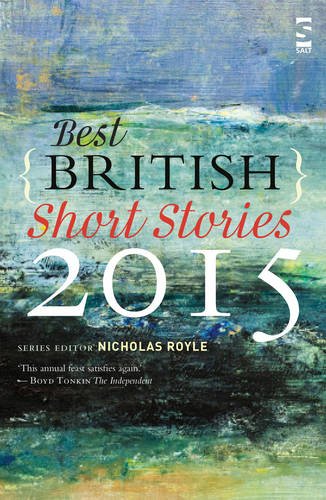
photo © Chris Goldberg, 2014
by Victoria Heath
An opening line should invite the reader to begin the story. It should say: Listen. Come in here. You want to know about this…
– Stephen King in an interview with Joe Fassler, for The Atlantic
Fassler followed up this interview by asking some established authors about their favourite first lines from books. Ernest Hemingway’s ‘The Short Happy Life of Francis Macomber’, Carson McCullers’ The Heart Is A Lonely Hunter, Raymond Chandler’s The Long Goodbye, Jean Toomer’s ‘Blood-Burning Moon’, even E. B. White’s Charlotte’s Web were among the chosen openers. The reasons behind the choices ranged from richness of detail, to sound and image, to excitement, and to, my favourite, ennui juxtaposed with disconsolate darkness.
When I came to read this year’s Best British Short Stories, I kept pondering the notion of first lines. After all, this is a place where the best of British is collected, and each of these stories must have hooked, from the very first word, the members of the SALT Publishing editorial board.
April 25th 1982, Downing Street: Announcement of the recapture of South Georgia, in the Falkland Islands.
This line, of course, comes from the story ‘The Assassination of Margaret Thatcher August 6th 1983’ by Hilary Mantel. What’s interesting, to me, about this line is the way in which it merges reality and fiction. We have just read the title, which we know to be fictional. Then instantly we are re-introduced to the past – a real, non-fiction past, a past that many readers remember vividly. And so, in this dry, public-announcement way, Mantel sets the story up, by giving us all the background we need in order to empathise with her assassin later in the story.
Whilst this is the opening line, the story proper actually begins after a brief back-and-forth between Thatcher and the Secretary of State, which culminates with Thatcher’s infamous comment about the Falklands war: “Rejoice”. The ‘second’ first line reads:
Picture first the street where she breathed her last.
Now that we have past events firmly in mind, this line moves us instantly from that dry tone of the announcement to speak directly to the reader. It involves us in the story, in the same way in which the narrator – an innocent woman whose flat is taken over by the assassin – is involved in the assassination. So, in two first lines, Mantel gives us a wealth of history, she involves the reader, and she provides enough intrigue to encourage reading on.
Probably my favourite first line in the anthology comes from ‘Fresh Water’ by Charles Wilkinson:
Whatever the boy was holding was a little too pale, and perhaps a little too pink, the Headmaster now realised, to have been extracted from a living body, but there was nevertheless something arterial about it that reminded him of the aftermath of open heart surgery.
 It may be long, but as first lines go, this is an absolute winner for me. It conjures gory images of an organ being ‘extracted’ – what great word choice – from a body, even though it is telling us that this didn’t happen. What better way to get people’s attention than a bit of gore, especially when it’s not really gore at all? It gives us the setting of a school, with two main characters: a potentially naughty teenage boy, and a Headmaster. And, finally, the line provides mystery, and mystery naturally equals intrigue. Of course we’re going to read on because, like the Headmaster, we now need to know what it is that the boy is holding that could have been confused with something ‘arterial’. It has to be something interesting, doesn’t it?
It may be long, but as first lines go, this is an absolute winner for me. It conjures gory images of an organ being ‘extracted’ – what great word choice – from a body, even though it is telling us that this didn’t happen. What better way to get people’s attention than a bit of gore, especially when it’s not really gore at all? It gives us the setting of a school, with two main characters: a potentially naughty teenage boy, and a Headmaster. And, finally, the line provides mystery, and mystery naturally equals intrigue. Of course we’re going to read on because, like the Headmaster, we now need to know what it is that the boy is holding that could have been confused with something ‘arterial’. It has to be something interesting, doesn’t it?
In terms of the story as a whole, this line does set it up well. The narrative uses an experimental style, moving between several protagonists and past events to get to the point where the Headmaster sees this boy. The sense of mystery is ever-present, encouraging the reader to connect with the sequence of events and piece together why each character matters. So this first line, like Mantel’s, piques curiosity, encouraging a reader to continue reading.
‘Secondhand Magic’ by Helen Marshall works in a similar way:
A bad thing is going to happen at the end of this story.
How could anyone resist a story that starts like this? It grabs our attention instantly, especially when paired with the title of the story, and also creates a compelling sense of fable. This is a huge spoiler, so perhaps avoid a few lines here and jump to ** now, but what makes this line even better, in hindsight, is that we never get to see that bad thing – something that must be so much worse than the bad things that happen in the tale itself. The story ends beautifully on the same note as it began: ‘And then the bad thing happened.’
** However, not every first line in this showcase of British writing is shouting, in an extroverted way, read me, read me! Some of the first lines are entirely unassuming. ‘Lightbox’ by Emma Cleary begins:
Elsie wears her picnic dress today, a black and white check.
Even when taking the title of the story into consideration, this still isn’t a must-read-on first line. But it does, at least I think it does, entirely embody the story that follows. Instead of sparking outright inquisitiveness, it presents facts about a main character – her on-trend dress style that’s in monotone – and the narrator – someone who is close to this character. By beginning with this description, we instantly understand that Elsie is the focus of the story. And, boy, is she the focus (again, here’s another spoiler **) – the story is told from the point of view of a stalker, but you have to read several pages before learning this information. Before the reveal, the narrator appears to be in a relationship with Elsie, the woman who has changed his life by introducing him to organic cafés and ‘heirloom tomatoes’. It’s the closeness of the unassuming first line that lulls us into a false sense of the characters’ relationships throughout the rest of the story.
** ‘Voice Over’ by Matthew Sperling also begins without a big brouhaha:
A: Hi, I’m Marlie Prince, and I played the character of Shawna in Forever a Stranger.
Here, Sperling simply begins his experimental form, that of a DVD ‘director’s cut’ style commentary. The story consists of a narrative between two of the characters from the film, and it gradually reveals more and more about a third character’s personal life and Marlie’s involvement with him. So could Sperling have started this story with more of a bang? I don’t think so, because, like ‘Lightbox’, the unassuming opening draws us into the style of the story. Here, it takes us into the commentary as if we were watching the DVD. The reader knows instantly that this isn’t a conventional narrative, and that’s why I would want to read on, in hope that the plot will be far from conventional too.
Some story openings, on the other hand, can be entirely familiar and still have the power to make us want to read. In the case of Joanna Walsh’s ‘Worlds From the Word’s End’, a starting line can conjure images of things we know well:
We need to talk.
Broken relationships. Miscommunication. A job poorly done. A masochistic teenager. There are countless possibilities that these simple four words could point towards, and the weight of the phrase would undoubtedly lead to a story full of emotion. This means there is the potential for a striking story, or a story that’s really bad, romance-lit. So if it were on a slush pile, instead of Best British Short Stories 2015, would this story still attract a reader? I think so, because the title hints at something literary and prepares us for the unexpected. And this story is unexpected: the need to talk is the innate theme of this letter-style narrative, in a world where the spoken and written word has become obsolete, at first un-cool, and then unneeded. So the familiar can be a starting point for a story, as long as it 1) has enough weight behind it to create some kind of intrigue, and 2) is followed by something so unfamiliar that the reader can be surprised.
Vanessa Gebbie wrote, in Short Circuit, that it’s the opening of a story that dictates ‘how successfully your reader is taken up in your world’ and, for me, each of these lines from Best British Short Stories 2015 fulfils this statement. Whether the first line draws you into an assassins web, or puzzles you over some flesh-like object – whether it gives you a burning desire to see something ‘bad’ happen at the end of the story, or pulls your attention directly to the focus of the tale, whether you want to see where an experimental line will take you, or where the twist will lie behind four familiar words – you are instantly dragged, quite fully, into the author’s world. You want to listen, you want to enter, and you want to know what it’s all about.

